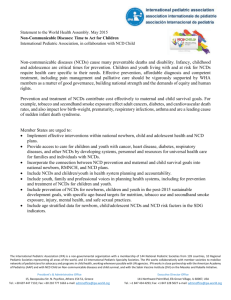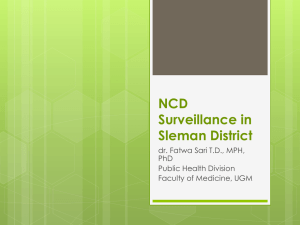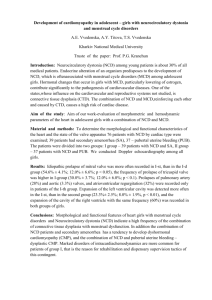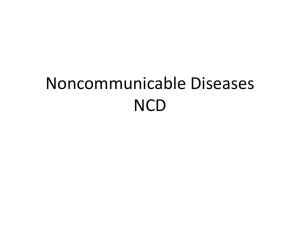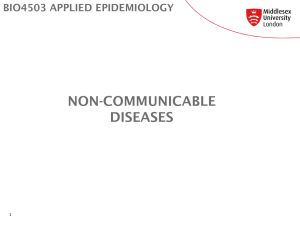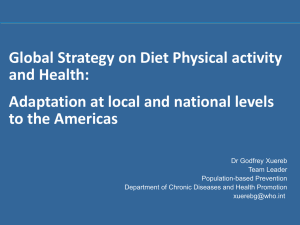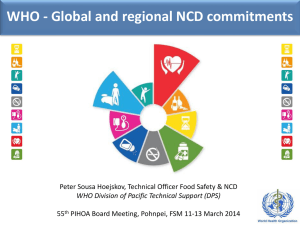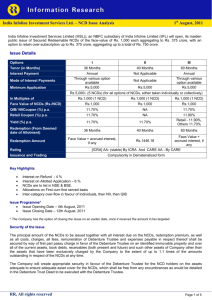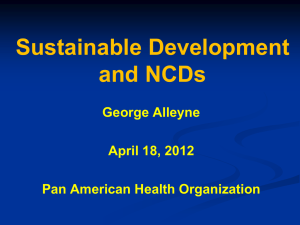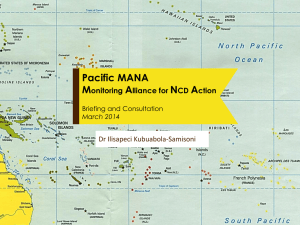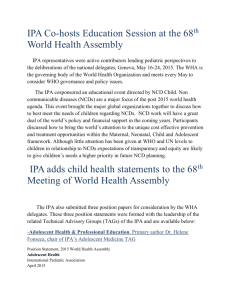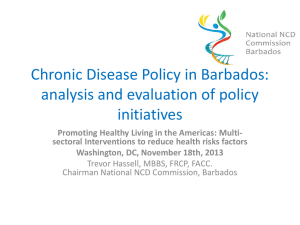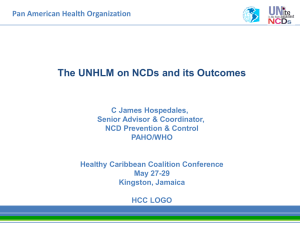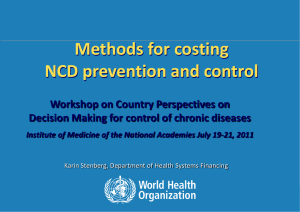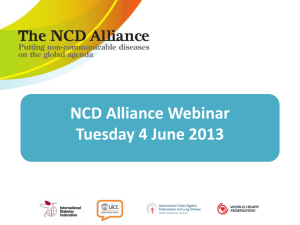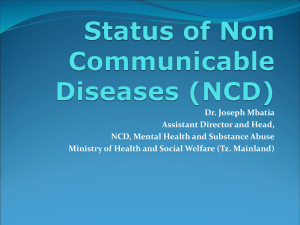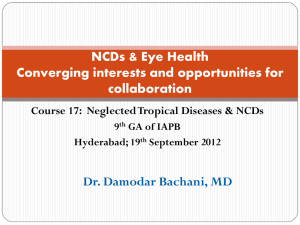1.11 ncd ajhsr
advertisement
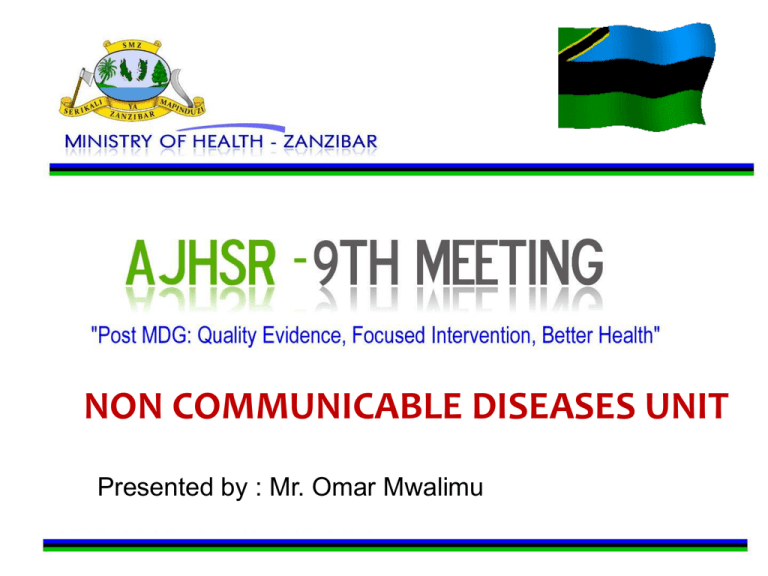
NON COMMUNICABLE DISEASES UNIT Presented by : Mr. Omar Mwalimu NON-COMMUNICABLE DISEASES (NCDs) The Major Challenge To Development In The 21st Century A threat to health and development Barrier to Development A Neglected Epidemic • NCDs are the leading cause of death and disability worldwide they account for 60 percent of all deaths globally • People living in developing countries are more likely to develop and die prematurely from chronic disease • Have limited access to comprehensive health services for NCDs • Live in countries that do not have effective policies for NCDs (tobacco, alcohol, air pollution, etc.) • In addition to their devastating impact on health, NCDs have a major socio-economic impact on individuals, families, communities, and countries NCD AND RISK FACTOR STATUS IN ZANZIBAR AS REVEALED BY STEP SURVEY – 2011 • Raised FBG – 3.7% • Raised BP – 33% • Fruits and vegs consumption – 2% • Physical inactivity – 18% • Alcohol consumption – 1.7% • Tobacco use – 7.3% • Obesity – 14.3% DIABETES RETINOPATHY STATUS IN ZANZIBAR • Prevalence of DR 101(28.3%) • Prevalence Sight threatening DR 33(9%) MAJOR ACHIEVEMENTS – 2013/2014 Key planned interventions Achievements Train 85 health care workers on NCD • Trained 190 HCW from 36 PHCU+, 4 PHCC, 3 prevention and management from PHCU+ DH and MMH and above as well as establishment of new 34 NCD clinics • Established new NCD clinics at 36 PHCU+ Procure and supply basic equipment for NCD • Procured and supplied equipment for care initiating/strengthening NCD clinics Develop NCD Strategic Plan II • Developed Integrated Non communicable Diseases Strategy and Action Plan for Zanzibar 2014-19 Conduct KAPB survey • Conducted KAPB survey which involved 710 HH and 210 HCW in five selected districts (2 Pemba and 3 Unguja) • Conducted health promotion sessions at various levels • Developed Tobacco control regulation Conduct community awareness activities MAJOR ACHIEVEMENTS – 2013/2014 Key planned interventions Achievements Screen people for eye problem • 2,485 were found with different problems • 750 were given spectacles • 1,516 were given other treatment Percentage of people undergone eye operation • 0.9% out of …. people underwent eye operation for various problems CHALLENGES – 2013/2014 MULTIPLE AND COMPLEX! • Addressing NCDs needs a joint effort from various sectors, but currently confined within the health sector • Limited access to comprehensive health services for NCDs • Little attention and commitment in creating a health-promoting built environment (No NCD prog. & prevention policies) • Limited knowledge about chronic disease and poor understanding of contributing risk factors amongst community • High increase of diabetes amongst children POTENTIAL SOLUTIONS TO KEY CHALLENGES • Review existing multi-sectoral accommodate NCD issues committee to • Advocate for drug availability especially at PHCU+ • Engage more higher level authorities/policy makers & develop NCD prevention regulations/policies • Increase community awareness on NCD risk factors and specific conditions FINANCES o World Diabetes Foundation is the main funder of NCD Unit o 550,000 USD allocated for 3.5 years (July 2012 – December 2015) o 60% of the funds is for equipping HFs, 2% External Auditing and the rest for the implementation of the activities 2013-2014 Source of funds Planned finances Funds received Expenditure RGoZ 1 5,920,000 0 0 WHO 12,675,000 12,675,000 12,675,000 2014-2015 Source of funds Planned finances Funds received Expenditure RGoZ 18,843,000 0 0 WHO 10,200,000 10,200,000 10,200,000 FOCUS VISION To create a healthy and prosperous environment in Zanzibar that will enable sustainable economic and social development, whilst minimising the exposure to the most common NCD risk factors and enabling those needing to access care to do so GOAL To reduce the exposure to the most common risk factors for NCDs and associated morbidity and mortality Outcome 1: A positive environment regards to NCD policy with Outcome 2: General knowledge of population with regards to NCD Risk factors and specific conditions increased Outcome 3: Delivery of NCD care at PHCU is improved Outcome 4: A positive environment regards to NCD policy with Outcome 5: The implementation of ZNCDS II is monitored and evaluated in a timely manner TAKE AWAY MESSAGES • NCDs are Killing and Disabling people at their PEAK PRODUCTIVITY • NCDs will Slow economic growth rates in poor countries • There is an urgent need to raise the profile of NCDs on the national development agenda LIFE STYLE BY CHOICE OR LIFE CONDITIONS? Lifestyle and behaviour does not take place in a vacuum but in a context defined by the political, economic and social reality THANK YOU FOR YOUR ATTENTION!!

